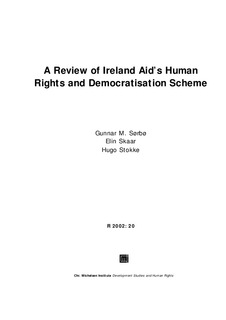| dc.contributor.author | Sørbø, Gunnar M. | |
| dc.contributor.author | Skaar, Elin | |
| dc.contributor.author | Stokke, Hugo | |
| dc.date.accessioned | 2008-02-26T08:54:59Z | |
| dc.date.accessioned | 2017-03-29T09:12:48Z | |
| dc.date.available | 2008-02-26T08:54:59Z | |
| dc.date.available | 2017-03-29T09:12:48Z | |
| dc.date.issued | 2002 | |
| dc.identifier.isbn | 82-8062-039-7 | |
| dc.identifier.issn | 0805-505X | |
| dc.identifier.uri | http://hdl.handle.net/11250/2435936 | |
| dc.description.abstract | In 1997, Ireland Aid (IA) established a Human Rights and Democratisation (HRD) scheme in order to assist projects outside IA’s programme countries. Its broad objective is to assist the development of democratic processes and institutions and the promotion and protection of human rights, mainly through support for relatively small-scale projects that contribute to training and capacity building.
Particular importance is attached to the impact of projects on awareness of HRD issues at grassroots community level and on the capacity of communities to assert their rights and gain access to and understanding of the processes and institutions of government. Funding for HRD projects is channelled through Irish, overseas and local NGOs, as well as through other international bodies. Requests for funding under the HRD scheme are also occasionally received from the Political Division of the Department of Foreign Affairs.
The main objective of this review is to outline strengths and weaknesses of the HRD scheme to date and to suggest practical options for its future direction. | |
| dc.language.iso | eng | |
| dc.publisher | Chr. Michelsen Institute | |
| dc.relation.ispartofseries | Research report | |
| dc.relation.ispartofseries | R 2002: 20 | |
| dc.subject | Development aid | |
| dc.subject | Human rights | |
| dc.subject | Democracy | |
| dc.subject | Ireland | |
| dc.title | A review of Ireland Aid's Human Rights and Democratisation Scheme | |
| dc.type | Research report | |
